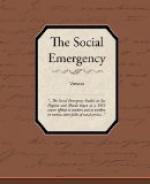Whether a child asks the conventional questions or the unexpected questions, and whether it asks questions or not, the parent ought to have some pretty definite notion of when, what, and how to tell a child. A child’s questions about the baby should be answered truthfully; all such replies as escape by the stork, cabbage-patch, or grocer-boy route should be avoided. It goes without saying that children’s questions should be met seriously and even reverently, and that parents should never speak of nor allude lightly, jokingly, or irreverently to sex relationships in the child’s presence.
A child may ask a question prematurely, or at a time when the parent finds it impossible to answer in such a way as to make the desired impression or to avoid the undesirable impression. The postponement should be frankly a postponement, and the parent should answer the question at some later time chosen by the parent and upon the parent’s own motion. If the child never affords the parent a natural opening for the first or later conversation, the parent should make the opening by reference to the recent arrival of a baby in the child’s home, or in some neighbor’s family, or even to the arrival of kittens or chicks.
Such preliminary information should come at or near the first asking of questions, or if no questions are asked, at any convenient time between the ages of six and eight years, and in any case before the child goes to school or mingles much away from home with other children. It is a mistake to suppose that very much need be said to the young child. If the child’s normal curiosity is satisfied in a clean way from the right source, that is sufficient. Especially should it be advised of the truth about those facts concerning which it is liable be misinformed in its contacts with other children. Only, parents ought to remember that their child, however carefully brought up and protected, at any time and of its own motion, may itself be that corrupting “other child” against which we are so sedulously warned!
Or, again, the child when it has been duly instructed by parents may without harmful intentions talk too freely with other children. It may do some harm to other children in this; but what is more likely, it may receive harm by calling out uninformed and hurtful conversation from the other side. For this reason, a parent in talking to children should be careful to explain that they should not talk to others. If they are properly brought-up children, their modesty will respond, and their trained obedience will keep faith.
This is the place to try to make clear the importance of such secrecy and confidence between parents and child. There is a secrecy which adds a glamour of pleasurable naughtiness, leading straight to prudery and pruriency with all their consequences. Such secrecy is the sort that develops when parents do take the child into their confidence. Such harmful secrecy is not to be confounded with the confidence




